#Pompeia magna
Explore tagged Tumblr posts
Text
Twelfth night production starring Pompeia Magna and Sextus Pompey (because the three genders are the living, the dead, and the mariners).
21 notes
·
View notes
Text
Okay of these three characters (all historical and real) who would you most be interested in reading novel/s about?
Pompeius Magnus - rule breaker, golden boy, literally the most likable guy, builder of great buildings and most successful general ever pretty much. He also respects women which is just unheard of in his day to the point people make fun of him for it. He's also got a lot of tragedy and loss and the most poignant and cinematic death in all of history
Sextus Pompeius - "pirate", rebel, heart of absolute gold, honorable even to the people who deserve it least. Savior to hundreds, lord of Sicily. Dutiful son of a slain father. Also experiences a lot of loss. The last resistance to the totalitarian triumvirs. Very successful against them for years and largely forgotten by history. He was given the libelous title of "pirate king" but that just makes him sound cooler if you ask me
Pompeia Magna - fatherless at age six, tumultuous childhood that ends with her being put in the care of her uncle (this is where history ends and my made up story for her begins) used as a pawn to curry favor with a man she despises who was responsible for the ruin of her family, proud in spite of her humiliation. Taken under the wing of the "empress" who knew her as a child. She brushes shoulders with some of the big names of her day including the eventual successor to the governing of the empire. Without any true family to guard and protect her she is both more exposed to danger but also capable of more freedom of movement. She navigates the deadly waters of Rome to outlive all her enemies and see the men who put her in harms way brought to justice and to finally achieve her lifelong goal of living in security on her family's ancestral lands
Definitely put any further thoughts in the comments and tags
#roman history#ancient rome#roman empire#how often do you think about the roman empire#ancient history#pompey#pompeius magnus#sextus pompey#julius caesar#augustus#marcus agrippa#marcus antonius#mark antony#pompeia#livia#livia drusilla#Pompeia magna#rome#romans#historical fiction#historical novels#the roman empire is my roman empire
19 notes
·
View notes
Text

@soldatrose thank you, looked it up, it makes even more sense now.
"Upon his return to Rome, having introduced his son Drusus into the forum, he immediately removed from Pompey's house, in the Carinae, to the gardens of Maecenas, on the Esquiline,1 and resigned himself entirely to his ease, performing only the common offices of civility in private life, without any preferment in the government. But Caius and Lucius being both carried off in the space of three years" - Suet. Tib. 15
Also, vaguely thinking about young Tiberius' time at Sicily with Sextus Pompey and Pompeia Magna. Something something, never returning home, the Odyssey theme, the same Odyssey theme prominent for Tiberius - cf. Edward Champlin, The Odyssey of Tiberius Caesar.

20 notes
·
View notes
Text
they should give me 100 million pounds to make a tv show about the very end of the roman republic i have 0 arts qualifications but i also have ideas such as 1) sextus gets his sick blue cape 2) pompeia magna and junia tertia start the plot to assassinate caesar 3) cassius has a weird thing going on with faustus sulla
11 notes
·
View notes
Text
do we want to think about how Pompeia Magna unintentionally tells her father she would have rather he died in the East, and then he goes and does just that
7 notes
·
View notes
Text
So do y'all wanna see my mental fan cast for the Pompeians as I write my books? Because that's what I feel like sharing tonight

Daddy Pompey aka Gnaeus Pompeius Magnus just with more auburn hued hair because we all know Pompeius has that ginger blond Alexander vibe going but like Lee Pace has the PERFECT chin and mouth to be Pompeius. Go look at Pompey's statues and imagine him as a younger man and you'll see it

Mucia Tertia mother of all three of Pompeius' children and such a force that not only did she raise them mostly by herself while he was at war but when her son is warring with the triumvirate they send her to talk with Sextus. She has the tragedy of outliving her ex-husband and her two sons. (Yes she's ginger too because I know my genetics and gotta keep that ginger blood strong so Pompeia can look just like grandad for plot purposes)

Sextus Pompeius Magnus Pius the sexy pirate king of Sicily. I will admit that this is mainly inspired by Hayden as RotS Anakin having the right color of hair and also the youthfulness. Sextus was stupidly young when he started kicking ass, just like his dad. Unfortunately for world history he lived an even shorter amount of time than his dad and was dead by 32 much like his dad's honorific namesake Alexander the Great

Fatherless by age six I have a whole story in my head that I've invented for Pompeia Magna daughter of Sextus and believe me it's not cheerful because what is in the Roman world. But she does have one true friend and he happens to be someone who is the most ride or die guy in Rome and will one day be the most powerful man in the empire

Tiberius Claudius Nero who has known Pompeia since they were toddlers together on Sicily when her father Sextus gave his parents refuge from Augustus' proscriptions. Yes Tiberius was a hottie. Fight me on this. Plus Cavill fits the Tiberius mould in the sense that everyone sees big hunky warrior but at heart they're just an absolute nerd. How Cavill is about video games would be Tiberius with Homer or something
#roman history#ancient rome#fan cast#roman empire#how often do you think about the roman empire#pompey#pompeius magnus#sextus pompey#tiberius#Tiberius Claudius Nero#mucia tertia#Sextus Pompeius#gnaeus pompeius magnus#Gnaeus Pompey#pompey the great#alexander the great#alexander#ancient history#the roman empire is my roman empire#sextus can sext us#augustus#julius caesar#livia drusilla#livia#Livia augusta#lee pace#judy greer#hayden christensen#henry cavill#Lily James
4 notes
·
View notes
Text
Currently researching and drafting a series of historical novels of Gnaeus Pompeius Magnus, his son Sextus Magnus Pius, and his granddaughter Pompeia Magna 😁😁😁
i never talk about it like ever but i really love learning about ancient history and ancient civilizations and would love to write a historical fiction story set in ancient times (that's not a retelling of any myth) but idk what kind of story that'd be and I think it'd be a book to write when i'm older but yeah i wanna see more historical fiction set in ancient times that isn't a greek myth retelling pls and thank you
19 notes
·
View notes
Text
Daughters of the Triumvirates
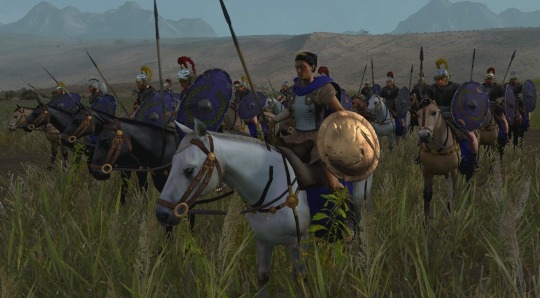
Once again using a Total War: Rome 2 mod that allows factions that can’t otherwise to use women generals, I started a couple Imperator Augustus campaigns specifically to give overlooked daughters of two blowhard Romans the chance to be more than bargaining chips for political marriages. For the first I played as the Pompeian faction and allowed Pompeia Magna, daughter of no less than Gnaeus Pompey Magnus, to take over her brother Sextus’s armies, leading them to victory over Octavian and his supporters.
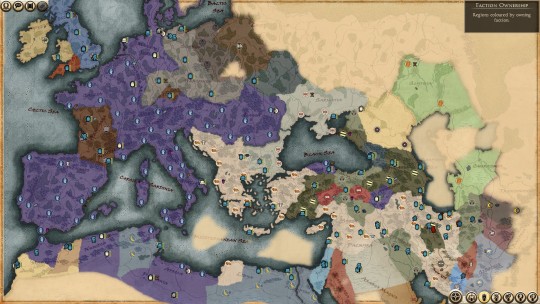
So I actually won with a Conquest Victory many turns ago, but here’s the map of the latest save. Tired of being married to losers named Cornelius, Pompeia made herself legatus of Legio I Equestris, spearheading the Pompeian invasion of Italy. Soon after, her sister-in-law, Servilla Calida, followed her example by taking over II Ferrata and even helping her sack Rome.
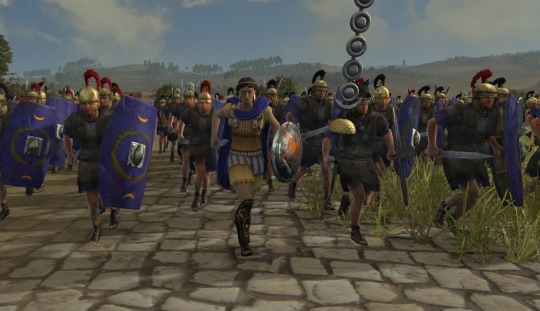
Allying with the Marcomanni, the Pompeians routed Octavian and his allies, taking over much of Gaul before diverting a couple legions east against the Getae. Before the ashes of Octavian’s funeral pyre were even cold, Cleopatra VII came asking for aid in her war against Lepidus and his allies. Though Cleo wouldn’t live to see Lepidus’s defeat, Pompeia and I Equestris played a pivotal role in his defeats in Africa while Servilla and II Ferrata were part of a multi-pronged offensive into Spain. Now allied with Mark Antony, the Pompeian legions are currently deployed at peacekeeping in conquered territories or at helping Antony mop up what’s left of his shattered enemies.
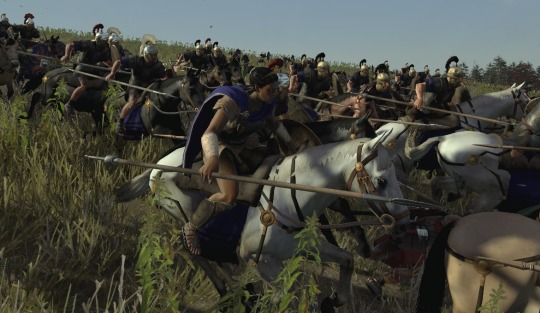
Annoyingly, the Augustus campaign’s mechanics don’t allow Pompeia to assassinate her brother or usurp his legacy to declare herself empress. Regardless, this was a pretty terrific and hard-hitting campaign. I was hoping to do the same kind of thing with Octavia, but for whatever reason she doesn’t show up anywhere in the campaign. I am, however, currently playing as Antony’s faction and letting his daughter Antonia lead a legion against the Parthians. Planning to do a write up for that campaign next.
Thanks so much for reading, folks! Take care and stay awesome!
14 notes
·
View notes
Text



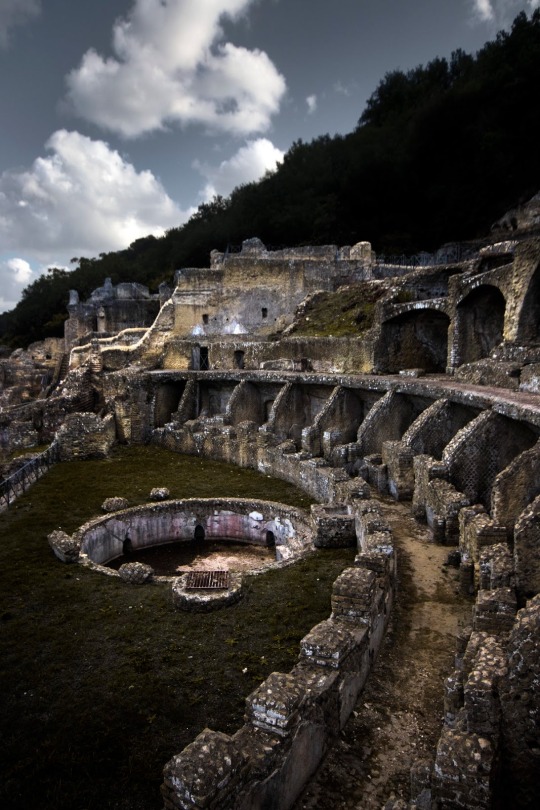
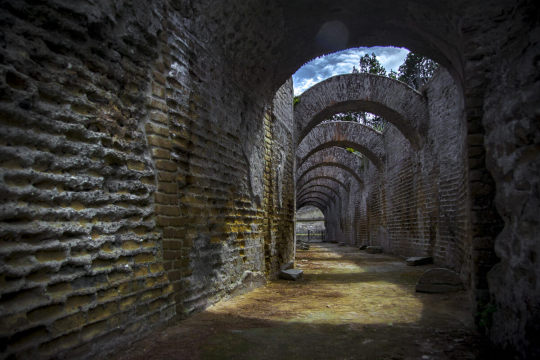
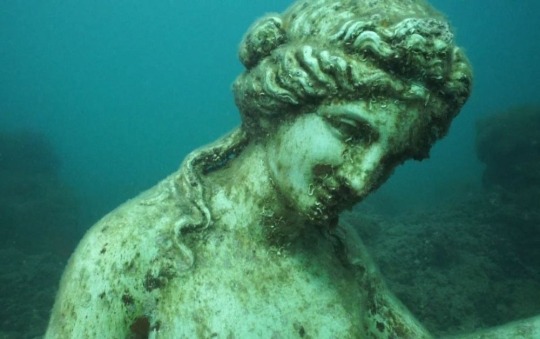
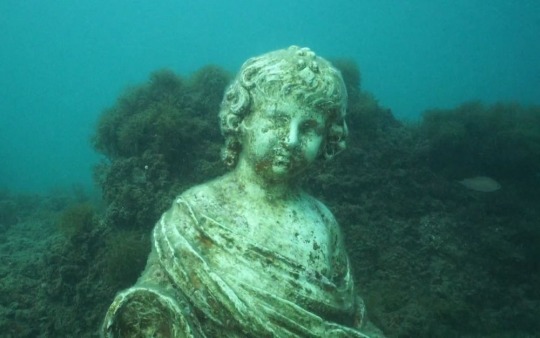

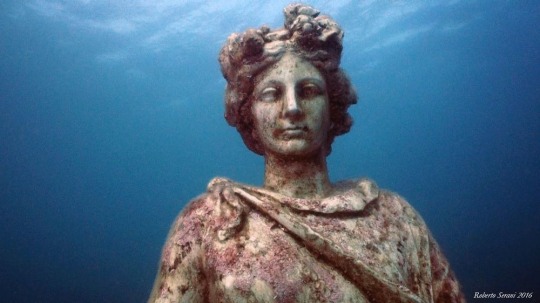
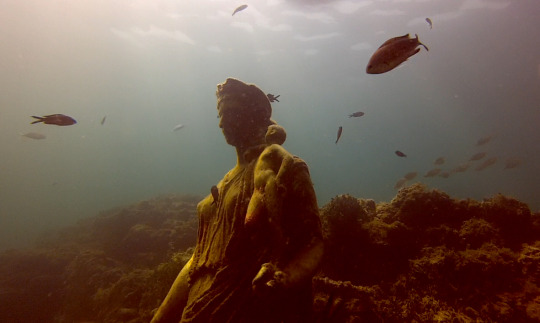
Baia, The Sunken Roman City
"Baia, Italy was an ancient city of Rome that was on the shore of the Gulf of Naples. Now it is considered part of Bacoli in the region of Campania. From 100 BC to 500 AD, the extremely rich and elite were the ones who had built luxurious villas in this area and Baia was one of these resorts that stood for centuries. The city itself was named after the helmsman of Odysseus’s ship in Homer’s Odyssey, who was said to have been buried close by. Even though the area was an active volcanic area, the city was still built on the Cumaean Peninsula in the Phlegraean Fields. Historical figures like Julius Caesar had a villa in this city and a lot of the town became the property of Augustus. Nero also had a villa built here in the middle of the 1st century with Hadrian, a Roman Emperor, dying here in 138 AD. There was also another emperor whose name was Septimius Severus, who loved the place, as it was his favorite place to be. Items were left on display here that once belonged to Pompey’s daughter, Pompeia Magna. She had given them to Tiberius – items such as a brooch, a cloak and gold bulla around the time of 120 AD. The ground was lowered below sea level in two phases. The first phase was between the 3rd and 5th centuries and then submerged more substantially a century later. By the 8th century, the lower part of the city was largely submerged by the sea. There were a few temples in the city and these structures were dome-like in nature, which included the Temple of Mercury, the Temple of Diana and the Temple of Venus. The Temple of Diana was used for thermal baths as it was collecting vapors from the ground below which is now half-collapsed. Having been a prominent resort city for so long, catering to the powerful Roman elite, the city was also famous for having healing hot springs that were medicinal. Because these springs were all around the city, it was easy to build spas over them. As beautiful as this underground city was, it did not last as the Saracens sacked it in the 8th century and by 1500, the only remains were abandoned. Once the place was abandoned, the water level rose because of volcanic action and drowned most of the ancient ruins."
-taken from historydaily link below
More images on my blog:
https://paganimagevault.blogspot.com/2019/11/baia-sunken-roman-city.html
#ancient rome#baia#classic art#forgotten#abandoned#dark academia#art history#apollo#european history#european art#pagan#history#italy#campania#naples#the odyssey#underwater
30 notes
·
View notes
Text
Bona Dea

By shirleytwofeathers
Bona Dea (“The Good Goddess”) was a divinity in ancient Roman religion. She was associated with chastity and fertility in women, healing, and the protection of the Roman state and people. According to Roman literary sources, she was brought from Magna Graecia at some time during the early or middle Republic, and was given her own state cult on the Aventine Hill.
Bona Dea was worshipped only by women. In fact, the presence of a man at rites in her honour were a sacrilige. May 1 was the annual, state-sponsored festival to Bona Dea at her temple. In early December, there was another private festival as well.
Her rites allowed women the use of strong wine and blood-sacrifice, things otherwise forbidden them by Roman tradition. Men were barred from her mysteries and the possession of her true name. Given that male authors had limited knowledge of her rites and attributes, ancient speculations about her identity abound, among them that she was an aspect of Terra, Ops, the Magna Mater, or Ceres, or a Latin form of Damia. Most often, she was identified as the wife, sister or daughter of the god Faunus, thus an equivalent or aspect of the nature-goddess Fauna, who could prophesy the fates of women.
The Good Goddess was a patron of the good of the earth and of chastity and fertility in women, she was invoked for healing and for freedom from slavery. Many of her worshippers were freed slaves and plebians, and many were women seeking aid in sickness or for fertility. She was also considered a protector from earthquakes.
Bona Dea was sometimes depicted with a scepter, vine leaves, wine, and a serpent, usually curled around her arm. Sometimes she was depicted seated, holding a cornucopia. Her image appeared on many coins.
The temple to Bona Dea in Rome stood over an overhanging rock, or cave, and both serpents and healing herbs are associated with the cave. The temple contained many kinds of healing herbs and snakes (both associated with medicine). Men were not allowed in her temple or at her festivals, nor were male animals.
The temple was decorated with vine-branches, and other plants and flowers (although myrtle was not permitted). Wine was served, but it was referred to as “milk” and the jar in which it was served, a “honey-pot.” A sow was sacrificed to her at the ritual.
Another ceremony was held in December in honour of the Bona Dea. The rites were conducted annually by the wife of the senior magistrate present in Rome in his home. She was assisted by the Vestal Virgins. The December rite was interesting because unlike the festival in May, it was not held in the goddess’ temple, not paid for by the state and the night of its celebration was not fixed. Unlike the May celebration, the December ceremony was an invitation only affair and pretty exclusive.
The celebrations for the Bona Dea seem to have been in the nature of a mystery cult. Men were strictly forbidden and the details that we have of the ceremony are from a late source, Macrobius. The worship seems to have been agricultural in origin and the careful exclusion of myrtle (associated with flagellation) may actually suggest origins as a purification ceremony.
In the year 62 BCE, the celebration was held in the home of Julius Caesar, then praetor and Pontifex Maximus, on December 3rd. His wife Pompeia and his mother, Aurelia, were in charge. A notorious Roman politician, Publius Clodius, dressed up as a woman and sneaked into the house. He was eventually caught by Caesar’s mother and kicked out. The ceremony had to be performed anew.
Caesar divorced his wife over it (claiming even she had to be above suspicion). Publius Clodius was sued and at his trial Cicero blew his alibi. The two became mortal enemies over the affair. The rites seemed to have fallen into disrepute over the events, and by the early empire, Juvenal suggested that it was nothing but a drunken orgy for girls.
Collected from various sources including: Women’s History, Ancient History, and Wikipedia
https://shirleytwofeathers.com/The_Blog/powers-that-be/bona-dea/
0 notes
Text
Wait. It just clicked that Pompeia Magna (the daughter of Pompey, who once told her father to go die in the Troyan war) was married two times:
Faustus Sulla;
Cinna the conspirator (who likely was not really a conspirator in 44 bce but he proclaimed believing in their beliefs once Caesar was dead). He was also one of the few people proscribed twice, participated in the rebellion of Lepidus-Brutus 78 bce and then joined Sertorius.
19 notes
·
View notes
Text
Remember when teenage Pompeia Magna told her father to go die via the Iliad reading?

Okay but this is so funny.
333 notes
·
View notes
Text
need to work out a timeline for 50-42 bc so i can work out if it was ever possible for pompeia and porcia to meet
#pompeia as in pompeia magna btw#rome tag#in the comic that exists entirely in my head they hang out and are also part of the conspiracy
3 notes
·
View notes
Text
on the topic of genealogy circles. the pompey & mucia tertia hell.
on the one hand, pompey marries aemilia, daughter of scaurus and caecilia, this caecilia being sulla's new wife who will bear him the twins faustus and fausta. faustus will marry pompeia magna, making pompey the (ex) son in law of his daughter's (dead) mother in law.
on the other hand, pompey marries mucia tertia with whom he'll have pompeia, gnaeus and sextus. he divorces her and mucia goes on to marry scaurus jr (this marriage potentially upsets pompey to the point where he actively contributes to sending scaurus jr into exile), making her the wife of pompey's (ex) brother in law.
which makes faustus, being the half-brother of aemilia and scaurus jr, both the son in law of pompey and mucia and a (half) brother in law (or ex half for pompey) to both of them, as well as gnaeus and sextus's brother in law.
finally scaurus jr jr (son of pompey's ex wife and pompey's ex brother in law) goes on to be the last person to desert his half brother sextus in the sicilian war and betrays him to antony's generals, thus causing sextus to be executed. he will himself be saved from execution at octavian's hands by the intervention of mucia, the mother he shared with sextus.
#also mucia's brother and son both married into the claudian family but i'm not gonna go there again#spam tag#end of human pomp#scaurus jr jr's wiki page fucked me up. i'm GONE.#barber chair
8 notes
·
View notes
Text

incredible stuff
6 notes
·
View notes
Text
I want to believe Pompeia overrode "the eldest son is named for the father" with her haunted auctoritas of the great name. I mean yes, technically Cn. Cinna Magnus could have had an elder brother, but why would I assume a boring version if the cool one is right here.


girl, the ghosts
14 notes
·
View notes